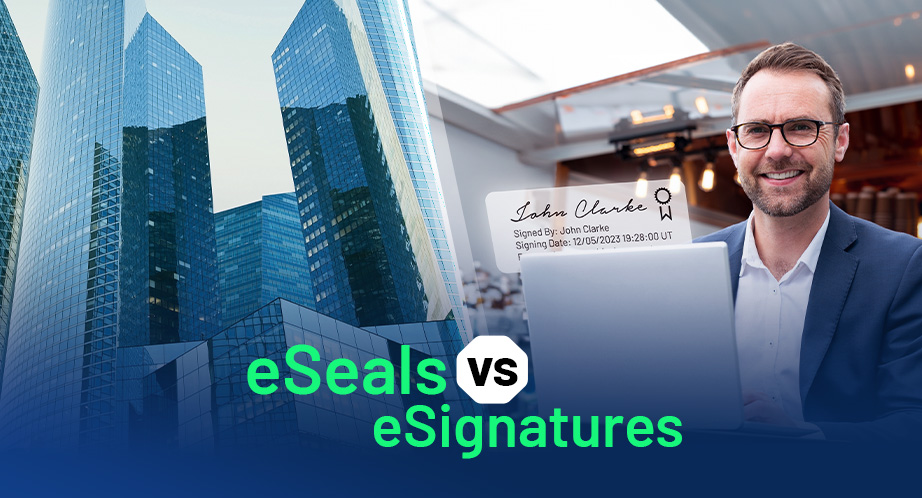In the era of paperless workflows and remote transactions, it’s crucial you ensure document validity and signer intent. Both electronic signatures (e-signatures or eSignatures) and electronic seals (eSeals) play vital roles in achieving this. Understanding the difference between these two technologies can be confusing.
This blog does a deep dive into the world of digital trust and document security, helping you understand the difference between eSeals and electronic signatures.

Distinguishing between electronic signatures and eSeals
Electronic signatures
Imagine the familiar act of signing a physical document, now translated into the digital realm. Electronic signatures represent various methods of signifying approval or agreement on an electronic document.
Their strength varies considerably, ranging from basic “click to sign” options to highly secure solutions that use digital certificates. eSignatures have various formats, with distinct levels of security and legal weight:
- Simple Electronic Signatures (SES): These offer minimal security, like typing your name or clicking a signature button. While convenient, they may not hold up in complex legal disputes.
- Advanced Electronic Signatures (AES): Employing cryptographic techniques, AES link the signature to both the signer and the document. They provide enhanced security and legal weight.
- Qualified Electronic Signature (QES): The highest level of electronic signature, adhering to stringent legal requirements outlined in regulations like the EU’s eIDAS Regulation. QES offer the strongest form of digital consent, recognised across borders.
Electronic seals
Think of the official wax seal traditionally used on important documents. eSeals translate this concept into the digital domain.
They verify both the origin and integrity of a document. eSeals assure a document comes from a specific organisation and isn’t tampered with. This produces trust in recipients and ensures document validity, particularly in high-stakes scenarios.
- Advanced Electronic Seals (AdES): Similar in security to AES, AdES confirm the organisation’s origin and document integrity. They are a valuable tool for internal document management and controlled distribution.
- Qualified Electronic Seals (QESeals): Matching the rigorous standards of QES, QESeals provide the highest level of trust and legal recognition. They are ideal for organisations operating internationally.
Industry applications for eSeals and eSignatures
Both electronic signatures and eSeals transcend industry boundaries, suiting many applications:
- Finance: Banks and insurance companies leverage them for contracts, loan agreements and insurance policies. They streamline processes and ensure the sanctity of financial transactions.
- Healthcare: Medical record consent forms, prescriptions and other sensitive documents utilise these technologies for secure patient information management and regulatory compliance.
- Real Estate: Lease agreements, contracts and disclosures often rely on e-signatures and eSeals for secure signing and efficient property transactions.
- Government: Online forms, permits and legal documents frequently involve these tools to promote transparency, citizen engagement and efficient governance.
Learn about the different industries that use SigningHub.
Navigating international eSignature and eSeal compliance
Understanding the legal landscape governing digital signature, electronic signature and eSeal technology is important.
The eIDAS Regulation (Regulation (EU) No 910/2014) sets the standard for electronic signatures and seals within the EU. It ensures cross-border validity and recognition. However, individual countries may have additional regulations.
The United States, for example, relies on the Electronic Signatures in Global and National Commerce Act (ESIGN) to establish the legal validity of electronic signatures. Additionally, international conventions like the UNCITRAL Model Law on Electronic Commerce play a role in facilitating global trade involving electronic documents.
eSeals and eSignatures with SigningHub
SigningHub empowers businesses to tackle the complexities of electronic signatures and eSeals with confidence. Our solution offers a user-friendly interface and reliable security features while facilitating:
- Seamless e-signature selection: Choose from SES, AES and QES options based on your security needs and legal requirements.
- Effortless eSeal creation: Create and apply AdES or QESeals to readily validate your organisation’s documents, promoting trust and compliance.
- Streamlined workflows: Upload documents, sign documents, invite signers, track the signing process and receive tamper-proof evidence – all within a secure, centralised platform.
eSignatures and eSeals reform document workflows, by offering increased productivity, security and global reach.
By understanding their distinctions, navigating the legal landscape and leveraging the power of SigningHub, businesses can embrace the digital era with confidence, leaving the complexities of document security behind.
Discover the power of SigningHub. Sign up for your free trial today or contact us to discuss enterprise SigningHub to take your business to the next level.


